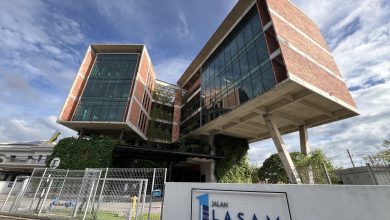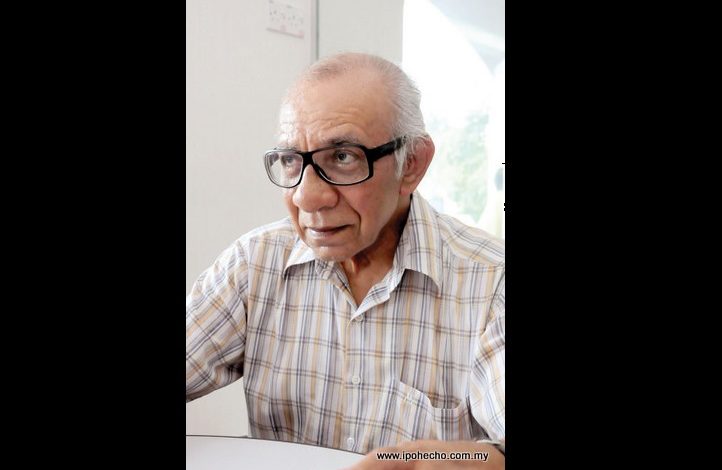

By Prema Arasu
Anwar Hassan kindly offered a few hours of his precious time away from family and charitable work to let me record some of his thoughts and adventures from over the last 70 some years. On reviewing my draft, he deleted the words “Dato’ Dr.” and said, “Those titles are not of importance anymore.”
This is another story offered to Ipoh Echo’s readership and the younger generation, with the hope of keeping alive the history, hopes and memories of some eminent Perakeans.
*This is the first part of a two-part series
***
Another Tale Worth Telling (Part 1)
If science starts off with curiosity, I certainly started with that trait. I was curious enough to want to know anything about everything that I saw. Sitting here at the Andersonian’s Club and looking out at the surroundings of this school which I attended for 13 years, I remember the spiders that we used to catch and keep in match boxes. During our class breaks, we schoolboys would set up spider competitions, and I used to wonder, “Why do these creatures fight when they’re put together?” I was in primary school, about 10 years old and many things like that about nature and people were intriguing.
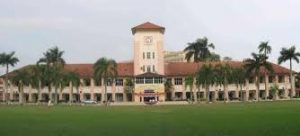

I grew up as a Muslim. In fact, I was born into the religion, there was no option. I was a non-conformist and didn’t accept religious doctrine without question. I was dismissed from my first Madrasah religious school for asking too many “stupid” questions. For example, we were told that we had to pray five times a day, and I would ask, “Why five?” The Ustaz told me that to have good faith, you do not question the teachings. I also liked to play and more likely that’s probably what got me dismissed. Given half a chance, I would skip class and go for a swim in the nearby Kinta river, which was very clear in those days, the water flowing swiftly over stones and green moss.
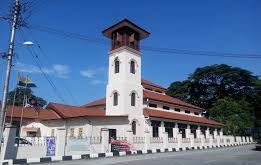

At my village in Kampong Paloh, our rented place was beside a Chinese temple. The temple was in a big wooden building, all of it ornately carved and painted. I remember the scent of the really big joss sticks that would be burning, and noticed that people would come to pray and bow and burn their own smaller joss sticks. I saw gentle-looking Buddhist monks in saffron robes. That Seng Wong Temple has since been renovated; it is over 140 years old and is named after the God that protects the city.
At the back, adjoining the temple, there was a Chinese opera house or Wayang China as we called it. I got used to listening to Chinese opera which my mother also enjoyed. At the time, I didn’t know any better and thought that the opera was part of the temple. What was more interesting to me was the backstage compared to the front stage of the opera theatre. The male actors, and there were only males back then, were made up to play the role of females. An absolute rascal who looked like a thug to me, could be transformed and act, walk, and be like a lady, swiveling this way and that way, after they had put on all the makeup and costumes.
It seemed also that Chinese worship seemed to embrace many spirits as such. I remember for example how they would celebrate the Ghost Festival or the Nine Emperor Gods Festival. At the opera theatre, the first row of two or three tables were always left vacant no matter how big the crowd was. As I was told much later, they believed that the spirits would always come to watch the opera and those seats were reserved for them.
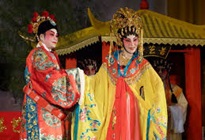

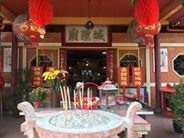

Chinese Opera in Ipoh and Seng Wong Temple in recent times
I was also intrigued by the Hindu festival of Thaipusam. I remember going to an Indian temple near the Gunung Cheroh limestone hills to watch their ceremonies. I was fascinated by people going into trance, the piercing with steel hooks and rods with no apparent evidence of pain or bleeding.
My childhood memories also included something quite traumatic.
My mother always said, “You must never steal. Ask, if you want something.” One day, she was making Bubur Kacang, green bean porridge with santan coconut milk and sugar. She had boiled and drained the beans into a sieve to have them ready to make the porridge. I asked for some beans but she chased me out of the kitchen. I didn’t give up and thought to myself, “I asked. You didn’t give. So, I have to steal.”
I was just about table height at the time at five years of age. Without hesitation, I went on tippy toes and reached over to get to some of the beans that were behind the pot of hot water that she had just strained out. It was the eve of Hari Raya, the end of the Muslim month of Ramadhan fasting. I heard someone coming into the kitchen and quickly pulled my hand back. My elbow hit and toppled the pot of hot water. “Awww!” I yelled from the heat and searing pain. Someone pulled off my shirt and I remember seeing strips of pink that was my peeled-off skin on the inside of the thin Rayon shirt. I remember that someone else poured fountain pen ink on my body probably thinking it would cool and soothe the burn.
I was rushed to the General Hospital and admitted to the children’s ward. The water had badly scalded my right armpit and chest area. A couple of days later, the Matron, a white lady, came to comfort and check on the patients. I remember that she asked, “Can I shake your hand? How are you?” She reached and took my right arm. I screamed in pain. My wound and armpit area were just starting to heal and unfortunately, her good intentions caused the new skin to tear and I started bleeding.
The nurses had to tie my right hand to the bed frame to keep it up. In those days, the GH hospital wards had floor-to-ceiling swivel doors which opened to the outside. At night when the wind blew against my skin, my wound got itchy and I furiously scratched my right side with my left hand. That wasn’t a good idea. The next day, the nurses tied my left hand up as well. It was that way for quite a long time. I was in the hospital for several weeks.
My mother didn’t scold me about what happened but it was a lesson learned. I still like Bubur Kacang and think of that day whenever I eat the porridge. Later in school, one of my teachers, Miss Fernandez, would scold me when I went for PE, physical education class. I wouldn’t take off my singlet to do my sports exercises because I didn’t want to be bare chested and have others see my scars. The marks have faded somewhat over the years.
I was grateful to the hospital staff who looked after me. That childhood accident taught me many things and impacted me in many ways.
I remember thinking that it’s a good thing to help and treat people well, as the nurses did for me. I believe it is one of the experiences that set the stage for doing welfare work later.
Those days at the hospital also awakened another interest. While I was admitted to the children’s ward with other children, half the ward was actually occupied by soldiers as all the other wards were full with soldiers too. This was during 1948 and 1949 when Malaya was going through post-World War II conflicts with Communist insurgents.
It was the first time I was seeing men with broken heads and arms, and all kinds of injuries. They were in bed side by side to where I was lying. It was a traumatic time. I remember one guy who cried the whole night, “You brought me here but you forgot to bring my leg!” Trying to soothe this patient, someone brought a leg from some place because he was crying so much. I remember the stench of decaying human flesh. The guy seemed happy to have “his” leg back and was clutching it close to him. But that night, he started yelling again. It turned out that he had kicked it accidentally. The leg had fallen under my bed.
The soldiers got priority in hospital care. I knew something horrible was happening in the country outside. All I saw were the consequences. Being bed-ridden and recovering in the hospital gave me time to think. I developed an interest in what was going on in general affairs. “Why were people fighting, why was it necessary to be injured and to suffer?”
For most of my school years, my idea was to have fun. I would go to school with marbles and tops, and play with friends. My parents had not gone to formal school.
In those days, Malay boys usually went to Malay language schools for a few years, and then to what was called “Remove Class” before they entered the English language schools in Standard 5 or 6 at age 11 or so. I, however, started right off at the Anderson School. My English was very bad. I probably knew 10 words and at that, I thought they were Malay words, not English words. They were words like “radio”, “football”, “referee”, “penalty”, and “goal”.
In school, I mingled with everybody. Most of my classmates especially in Primary 1 to 4 were Chinese and Indian anyway, and I had no choice but to mix. I learned from them while playing marbles and getting into spider fighting contests. My Chinese friends would invite me to their homes to celebrate Chinese New Year. Growing up in a multi-racial society, I had exposure to these other religions and cultures too.
Why did I then study veterinary science and medicine? It was mostly in the last two years in Form 6 that I became more focused about my future.
To be continued in Part 2
© Prema Arasu, July 20 2020
=================================
About Prema Arasu:
Prema was formerly a student at the Ipoh Main Convent. She retired as a biomedical research scientist and professor from the U.S. academic system. She currently enjoys yoga, being out in nature, and doing short term projects related to science and global health.
wmnwsdm@gmail.com


